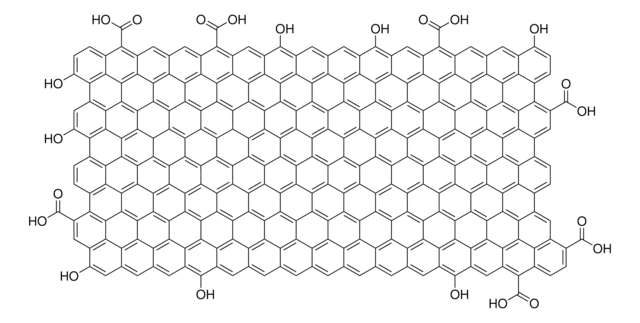804126
Carbon nanohorns, oxidized
avg. no. of layers, 1
Synonym(s):
CNHox, Holey Carbon Nanohorns
About This Item
Recommended Products
description
Dispersibility in water: hydrophilic
Quality Level
Assay
90% (TGA)
form
powder or crystals
feature
avg. no. of layers 1
greener alternative product characteristics
Design for Energy Efficiency
Learn more about the Principles of Green Chemistry.
sustainability
Greener Alternative Product
surface area
1300-1400 m2/g , BET
impurities
0% Metallic compound
10% graphite; amorphous
diameter
2-5 nm (TEM)
greener alternative category
, Enabling
General description
- Single-walled carbon nanohorns are made of graphene sheets with long cone-shaped tips with the diameters of 2-5 nm and the length of 40-50 nm. Thousands of carbon nanohorns form spherical aggregates of about 100 nm in diameter.
- Uniform size
- High dispersion
- High purity, no metallic compound
- Large surface area
- Utilization of internal space in carbon nanohorn
- Holes were formed on the sheath of carbon nanohorn by oxidation treatments. Several materials can be accessible into thecarbon nanohorn sheath.
Application
- Energy management system:
Fuel cell (Good support materials for catalyst metal such as platinum)
- Medical :Carrier containing the anticancer drug
- Gas adsorption: Adsorption of highly reactive gas
- Compound material: Additive for characteristic improvement (improve electrical properties)
Storage Class Code
13 - Non Combustible Solids
WGK
nwg
Flash Point(F)
Not applicable
Flash Point(C)
Not applicable
Certificates of Analysis (COA)
Search for Certificates of Analysis (COA) by entering the products Lot/Batch Number. Lot and Batch Numbers can be found on a product’s label following the words ‘Lot’ or ‘Batch’.
Already Own This Product?
Find documentation for the products that you have recently purchased in the Document Library.
Our team of scientists has experience in all areas of research including Life Science, Material Science, Chemical Synthesis, Chromatography, Analytical and many others.
Contact Technical Service







